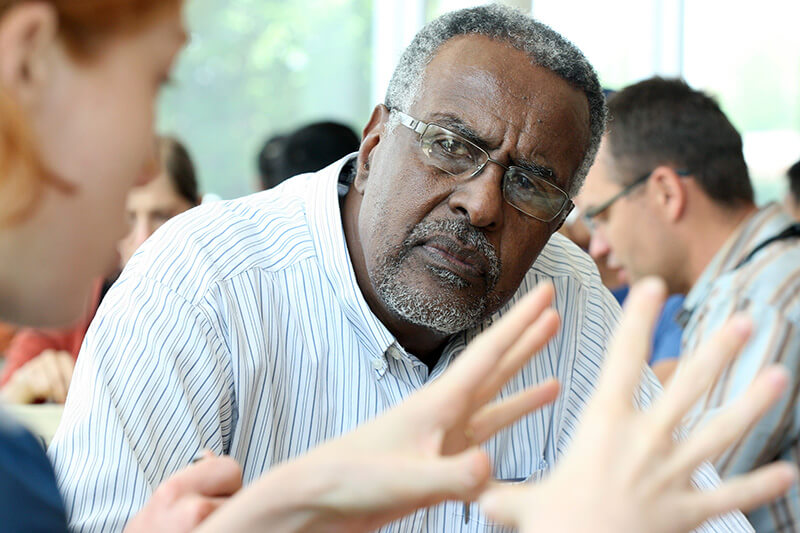June 1, 2017
Borlaug Fellows undergo intensive training on how to feed 9.5 billion people by 2050
 Gebisa Ejeta, director of the Center for Global Food Security at Purdue University and 2009 World Food Prize laureate, is among the distinguished speakers for the Borlaug Fellow Summer Institute on Global Food Security. (Purdue Agricultural Communication photo/Tom Campbell)
Download image
Gebisa Ejeta, director of the Center for Global Food Security at Purdue University and 2009 World Food Prize laureate, is among the distinguished speakers for the Borlaug Fellow Summer Institute on Global Food Security. (Purdue Agricultural Communication photo/Tom Campbell)
Download image
WEST LAFAYETTE, Ind. - With a looming global food deficit and an ongoing famine crisis, the 2017 class of the Borlaug Fellow Summer Institute on Global Food Security could face one of the most challenging sessions since the program started six years ago.
The two-week intensive program, which gets underway June 4 at Purdue University, is designed to equip 40 graduate students with the multidisciplinary tools needed to solve real-world development challenges with global food security.
This year, the summer institute comes at a time when researchers are urgently seeking ways to feed an expanding population, said Gebisa Ejeta, director of the Center for Global Food Security, based at Purdue's Discovery Park.
Ejeta, distinguished professor of agronomy and the 2009 World Food Prize laureate, and several Purdue faculty members work with the students throughout the two-week period of the institute.
“There is a heightened concern about global food security,” Ejeta said. “According to the latest estimates, there will be 9.5 billion people on the planet by 2050. Based on our projections, there will be a worldwide food deficit unless we can improve food production significantly. We will need an overall 75 percent increase in food production over today’s levels to meet those projected demands.”
Also, Ejeta said, a massive famine is endangering the lives of 20 million people in northern Nigeria, Somalia, South Sudan and Yemen at a level that is unprecedented in recent history. “There is a lot of concern about the need to pull people out of hunger and poverty,” he said.
The 40 graduate students attending the Borlaug Institute will attend workshops and hear from guest speakers, including Julie Borlaug of the Norman Borlaug Institute for International Agriculture. Borlaug is the granddaughter of the institute’s namesake, Norman E. Borlaug, who was awarded the Nobel Peace Prize in 1970 for a lifetime of work to feed a hungry world. The institute participants will learn the importance of addressing the grand challenges impacting food production such as climate change, energy, water, international trade policies, environmental concerns and nutrition - all of which must be considered when determining solutions for global food security.
“Those are challenges that humankind has been faced with for a while,” Ejeta said. “We call them wicked problems because we don’t know how to fully address them. There isn’t agreement on how to even define them. There are so many uncertainties around climate change, for example.
“The program is oriented towards getting the next generation of scientists across multiple disciplines to become the champions of global food security,” he added. “They’re following the legacy of Borlaug, who is known as the father of the green revolution.”
The challenges discussed during the program can be more complex than the average person may assume. “It’s important to understand that it’s not just about a lack of food in the cabinets or not having enough money to buy food,” Ejeta said. “There also are situations in which people may have decent crops but no way to preserve it so it lasts for the whole year.”
As part of the session, students will break down in smaller groups to delve into topics impacting food security in developing countries. They will propose potential solutions to specific situations and present them to a panel of experts during the last day of the summer institute.
The 40 fellows, including 14 students who are from other countries, represent various disciplines, including anthropology, sociology, political science, geography, economics, international development policy and engineering.
That mix of disciplines and the intensity of the session were among the highlights of the Borlaug Institute, according to 2014 Borlaug Fellow Diana L. Caley, who is currently working as an adviser on food security and monitoring and evaluation for Crown Agents in Washington, D.C.
“The summer institute is unlike any other academic program,” Caley said. “It truly was transformative. It brings together a cohort of scholars from all around the world in different disciplines and with unique perspectives. They were involved in every aspect of the global food system.
“We were able to work toward identifying common ground across different disciplines,” she added. “It provided us a platform in which we could all stand together in a collaborative environment and set goals with the support of world-renown faculty.”
Funding for the U.S. Borlaug Fellows comes from a five-year, $5 million grant to Purdue from the U.S. Agency for International Development (USAID). Grants ranging from $15,000 to $40,000 per student help support graduate students interested in conducting critical food security research toward a master's or doctoral degree.
Writer: Shari Finnell, 317-201-2345, sfinnell@purdue.edu
Source: Pamela McClure, 765-494-5442, pmcclure@purdue.edu
Agricultural Communications: (765) 494-8415;
Shari Finnell, Manager/Media Relations and Public Information, sfinnell@purdue.edu
Agriculture News Page

